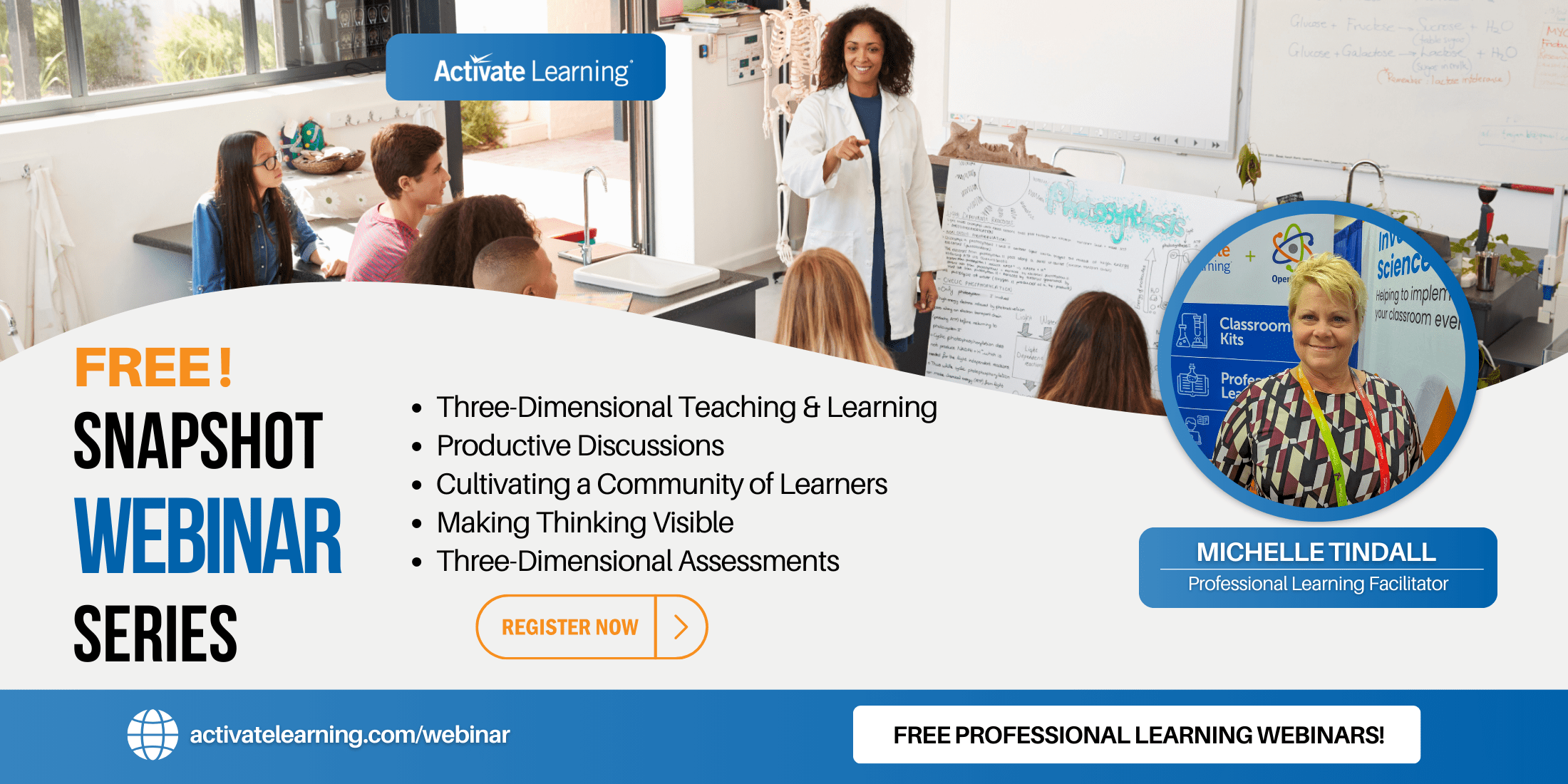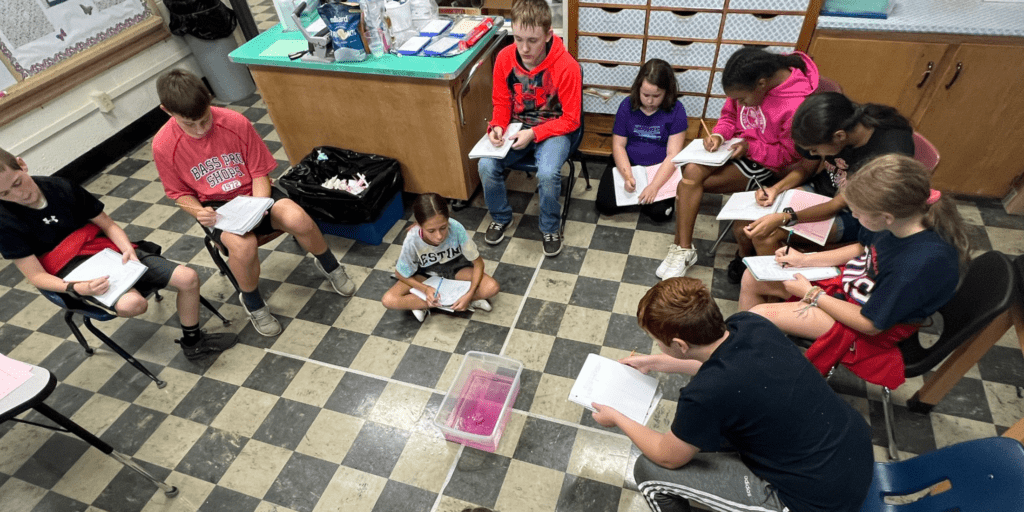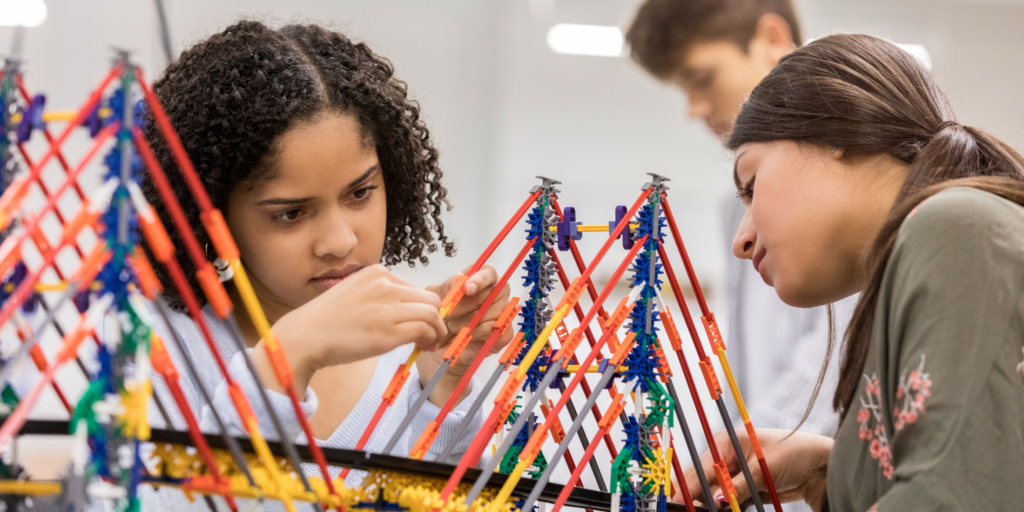Professional Learning without Borders: 5 Relaxing Ways to Boost Your Science Teaching This Summer 😎
Professional Learning without Borders: 5 Relaxing Ways to Boost Your Science Teaching This Summer 😎

Quick Take: Ready to supercharge your science teaching skills while soaking up the summer sun? Check out our hand-picked selection of fun, unconventional summer professional learning resources! From Neil deGrasse Tyson's sci-fi movie recommendations to cutting-edge science books and student-approved TV shows, we've got your summer professional development covered. Discover fresh ideas to energize your classroom. Don't let the summer slip away - join us on this exciting journey of relaxed learning that will leave you inspired and ready for the new school year! 🌞
Who says professional development can't be a blast? Embrace entertaining summer professional learning opportunities to skyrocket your science teaching skills and inspire you for the new school year!
Whether you're looking to enhance your curriculum, get up to speed on the latest teaching tools and strategies, find new ways to engage students, or enjoy some science-themed entertainment, we've got you covered.
Last month, we kicked off the summer with a free webinar series, Snapshot Webinar Series: Transforming Instruction and Assessment for High School Science, highlighting our research-grounded strategies for implementing three-dimensional learning in high school settings. You won’t want to miss this hands-on, interactive learning experience so register for the series today!
But remember, all work and no play is no fun! That's why we’ve scoured the universe (okay, just the internet) to bring you five out-of-the-box resources that’ll make your summer break enjoyable and enriching. From a list of sci-fi movies curated by Neil deGrasse Tyson to new science must-reads and top science TV shows recommended by students, there’s something on our list for everyone. So, grab a cool drink and enjoy summer professional learning without borders while soaking up the summer vibes!
1. Journey Through Neil deGrasse Tyson's Sci-Fi Movie Tier List🎥🍿
.
.
Ever wondered how your favorite sci-fi films stack up against the scrutiny of a renowned astrophysicist? 🤔
.
Neil deGrasse Tyson, the astrophysicist extraordinaire, takes us on a thrilling journey through some of the most iconic sci-fi movies of the last century. But here's the twist – he's not just listing them; he's ranking them against each other based on his unique perspective as a scientist!
.
You might be surprised by his rankings – some of your favorites might soar to the top, while others could face some serious stellar criticism.
.
This video is a must-watch for science teachers and sci-fi enthusiasts alike. It's not just entertainment; it's an opportunity to critically examine the science in science fiction. Who knows? You might discover some great discussion points for your next lesson on space exploration or the ethics of scientific advancement that students will love.
.
Ready to challenge your assumptions and maybe discover a new favorite film? Here are the movies he analyzes:
- The Black Hole
- The Matrix
- The Martian
- The Blob
- Contact
- Interstellar
- Gravity
- Back to the Future
- A Quiet Earth
- Arrival
- The Europa Report
- Armageddon
- Close Encounters of The Third Kind
- Deep Impact
- The Day the Earth Stood Still
- Independence Day
- The Terminator
- 2001: A Space Odyssey
Grab your popcorn for this sci-fi movie fest!
2. Level Up with Science-Based Video Games 🎮
.

.
Think video games are just for kids? Think again! Explore games that use real scientific concepts to engage and educate players. Not only will you have fun, but you'll also gain fresh ideas for gamifying your lessons. Warning: May cause extreme excitement and loss of track of time!
.
- Portal Series (Physics): Players must navigate through various rooms by cleverly placing these portals, requiring creativity, resourcefulness, and a basic understanding of physics. The game's core mechanics revolve around how forces like gravity interact with the portals, making portal placement crucial for progression and adding depth to the puzzle-solving experience. [learn more]
. - Phylo (Molecular Biology): Phylo harnesses human computing power to solve molecular biology's complex Multiple Sequence Alignment problem. This tool helps scientists decipher DNA, identify new genes, and trace genetic diseases by comparing genomes from various species. While traditional algorithms struggle with the computational complexity of achieving optimal alignments across large genomes, Phylo turns this challenge into an engaging puzzle game for players to solve. [learn more]
. - Kerbal Space Program (Space Science): Players manage their own space program, from building rockets to launching them into space. The sandbox, science, and career modes offer varying levels of complexity, allowing players to experiment freely or engage in more realistic space expedition simulations. This cute yet scientifically accurate game fulfills astronaut dreams while teaching real principles of rocketry and space exploration. [learn more]
. - Car Mechanic Simulator (Engineering): This game brings the hands-on world of automotive engineering to life, challenging players to diagnose and repair a variety of vehicles. The game features realistic car models and mechanics, requiring players to disassemble and reassemble various parts to identify and fix issues. As players successfully complete repairs, they can expand their workshop, buy and restore cars, showcasing how science and engineering principles apply in practical, everyday scenarios. [learn more]
. - Terra Nil (Environmental Science & Sustainability): Terra Nil is a reverse city builder where players transform barren landscapes into thriving ecosystems using eco-friendly technology. The game challenges players to create diverse habitats, clean polluted areas, and foster animal life across procedurally generated maps. Uniquely, Terra Nil emphasizes environmental sustainability by requiring players to recycle their structures and leave no trace, ultimately creating a pristine wilderness. [learn more]
3. Must-See Science TV Shows Recommended by Students 📺
.

.
The University of Waterloo recently polled their science students to ask what science-based content they've been streaming lately. These students are on top of their science game! Their top five binge-worthy recommendations could inspire fresh ideas for your classroom:
- Genius (Disney+): Genius is an anthology series that dramatizes the lives of revolutionary innovators, exploring their triumphs and challenges across various fields in each season. [watch]
- Our Planet (Netflix): This docuseries offers a stunning exploration of Earth's biodiversity and vulnerability. It vividly illustrates the far-reaching effects of climate change on all life forms, inspiring viewers to appreciate and protect our shared home. [watch]
- Kurzgesagt — In a Nutshell (YouTube): Kurzgesagt—In a Nutshell is a YouTube channel featuring captivating, animated videos that explain diverse scientific concepts, ranging from cosmic scenarios to microscopic marvels. [watch]
- Human: The World Within (Netflix): This docuseries blends state-of-the-art science with compelling personal narratives to reveal the extraordinary mechanisms of the human body. [watch]
- Crash Course History of Science (YouTube): Hank Green's engaging "History of Science" series explores the evolution of the Scientific Method and historical approaches to life's big questions. [watch]
4. Dive into New Science Page-Turners 📚
.
Beach reads aren’t just for romance novels! Explore the edge of science with these five exciting new titles making waves for their bold vision of the future. Here’s our shortlist of summer science must-reads:
.
- Space Oddities: The Mysterious Anomalies Challenging Our Understanding of the Universe (March 2024): Experimental physicist Harry Cliff explores perplexing cosmic phenomena that challenge our current understanding of the universe. From high-energy particles in Antarctica to unexplained forces affecting matter, Cliff takes readers on a global journey through cutting-edge research facilities, introducing the scientists grappling with these mysteries and how these anomalies might reshape our comprehension of physics, cosmology, and reality. [read more]
. - AI FOR EDUCATORS: Embrace New Technologies to Enrich Curriculum, Improve Teaching Methods, Reduce Burnout, and Save Time and Energy with Strategies That Work (January 2024): This highly-rated book, written by a teacher, explores how Artificial Intelligence can revolutionize education by alleviating teacher burnout and enhancing personalized learning. It offers practical insights on responsibly implementing AI tools in the classroom, presenting AI as a powerful ally for educators and promising to improve teacher well-being and student engagement. [read more]
. - Race for a Remedy: The Science and Scientists behind the Next Life-Saving Cancer Medicine (July 2024): Race for a Remedy explores the complex journey of transforming molecules into FDA-approved medicines, detailing the scientific, economic, and competitive challenges in the trillion-dollar pharmaceutical industry. Dr. Ahmed provides insights into various drug types, from small molecules to cutting-edge cell therapies, while highlighting the industry's relentless pursuit of creating the next life-saving cancer treatment. [read more]
.
. - Birding to Change the World: A Memoir (February 2024): Former investigative journalist turned environmental activist and professor, Trish O'Kane, chronicles her transformation from a nature-disconnected urbanite to a passionate ornithologist following the devastation of Hurricane Katrina. Through her encounters with various bird species, O'Kane finds solace, purpose, and a new career path in environmental studies. The memoir intertwines personal experiences with scientific insights about bird behavior and ecology. It culminates in a successful community effort to protect Madison's Warner Park from development, highlighting the power of citizen engagement and the joy of connecting with nature. [read more]
. - Our Moon: How Earth's Celestial Companion Transformed the Planet, Guided Evolution, and Made Us Who We Are (January 2024): This national bestseller takes readers on a fascinating journey through the Moon's 4.51-billion-year history, revealing its crucial role in stabilizing Earth's climate, influencing biological processes, and shaping human culture and science. Boyle weaves scientific facts, historical anecdotes, and cultural insights to demonstrate the Moon's significance in everything from animal behavior to the development of early civilizations and modern astronomy. The book also touches on current and future lunar explorations, raising questions about the Moon's resources and ownership in the age of space commercialization. [read more]
5. Recharge Your Science Teaching: 5 Enlightening Webinar Replays 📼
.
.
Our curated selection of webinar replays from the past school year is like a greatest-hits album for science education. Learn from top educators and industry experts, discover new teaching strategies, and get inspired – all from the comfort of your hammock.
.
- Catherine M. Jackson: Molecular World: Making Modern Chemistry (June 2024): In this fascinating webinar hosted by the Royal Society of Chemistry, Catherine Jackson challenges traditional views of chemistry's 19th-century transformation. Rather than being driven solely by theory, Jackson reveals how hands-on experimentation and "laboratory reasoning" were the true catalysts of change. Explore how the "glassware revolution," a shift towards synthesis, and the "chemical identity crisis" laid the groundwork for modern organic chemistry. This thought-provoking talk offers a new lens through which to view chemistry's history, making it a must-watch for science educators looking to enrich their understanding and inspire their students. [watch replay]
. - Roundtable Webinar: Why We Created a Portrait of a Graduate (June 2024): This roundtable webinar hosted by EdWeek explores the evolving concept of a 'portrait of a graduate,' which goes beyond traditional metrics to define student success in terms of skills and attributes essential for ethical, global citizenship. Three experienced school leaders discuss the process of creating such a portrait, aligning it with the school vision, implementing student-centered pedagogies, and engaging the community. The webinar covers the application of this concept from elementary through high school, emphasizing its importance throughout a student's educational journey. [watch replay]
. - Board on Science Education 20th Anniversary Monthly Celebration: Classroom Impact of the Framework (March 2024): The National Academies of Sciences, Engineering, and Medicine hosted this informative webinar offering valuable insights into the real-world application of the Framework for K-12 Science Education featuring a diverse panel of experienced educators from across the country sharing how they've implemented this visionary approach in their classrooms over the past decade! [watch replay]
. - Community Developed Resources—Explore the Openscapes (Open Science) Earthdata Cloud Cookbook (February 2024): NASA Openscapes is a community of NASA data center staff and open science contributors supporting researchers in migrating their data workflows to the Cloud. This webinar showcases their Earthdata Cloud Cookbook, a comprehensive collection of open-source resources designed to help researchers work with Earth science data in the Cloud. The Cookbook, refined through numerous workshops, includes tutorials, workflows, and cheatsheets that streamline data access and analysis. The webinar demonstrated how to effectively use these resources, making them valuable tools for Earth science researchers. [watch replay]
. - Build a Nucleus: K-12 Classroom Investigations (March 2024): Hosted by the American Nuclear Society, this webinar showcased "Build a Nucleus," a new simulation from PhET Interactive Simulations at the University of Colorado Boulder. Creator Luisa Vargas Suarez demonstrated this K-12 educational tool, allowing students to explore atomic structure interactively. The webinar highlighted the simulation's features and its applications for classroom investigations, providing science teachers with valuable resources to enhance their atomic structure lessons. [watch replay]
These summer professional learning resources complement our summer webinar series perfectly, giving you a well-rounded buffet of engaging professional learning options. By diving into these diverse learning resources, come fall, you'll be armed with fresh ideas and renewed enthusiasm.
Have a fun, science-filled summer! 😎
* * * * * *




